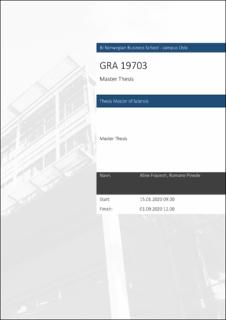| dc.description.abstract | This study aims to answer the research question: How do consumers react to
food products labelled as “antibiotic-free”?, by unraveling whether
consumers are positively influenced by an “antibiotic-free” label affixed on
products. We here investigate if the presence of an “antibiotic-free” label
positively influences the respondent’s purchase intentions, the product’s
perceived quality and taste, as well as the respondent’s trust towards the
product, the price he is willing to pay to acquire the product, and if this price
is affected by the respondent’s knowledge about antibiotics. We here focus on
food products and more especially on meat, investigating the French market
and French consumers, in a context of blurred legislations due to a
controversial ratification of the CETA, and in a climate of sanitary crisis
caused by the outbreak of the Covid-19.
By presenting respondents, thanks to an online experiment, with three
different products bearing one, three and no “antibiotic-free” label at all, we
came to the conclusion that the presence of an “antibiotic-free” label
generates higher purchase intentions and willingness to pay, positively
influences the product’s perceived quality, and positively influences trust
towards the product. However, we could not state that the presence of an
“antibiotic-free” label on a product positively influences the perceived taste
respondents report. In addition to that, we conclude that there is a positive
significant correlation between the respondents’ level of knowledge about
antibiotics and their willingness to pay for products that bear at least one
“antibiotic-free” label.
Therefore, creating an official “antibiotic-free” label could be beneficial for
European and French meat producers, since there is a potential market for
it. However, in order to maximize the sales, it seems to be crucial to educate
the French public to deepen their knowledge about antibiotics. Customers
with a thorough knowledge of antibiotics would be able to fully understand
the advantages of such a label, providing an additional value for the product
bearing it, compared to a product imported from Canada, which may even
present risks for customers’ health. | en_US |
